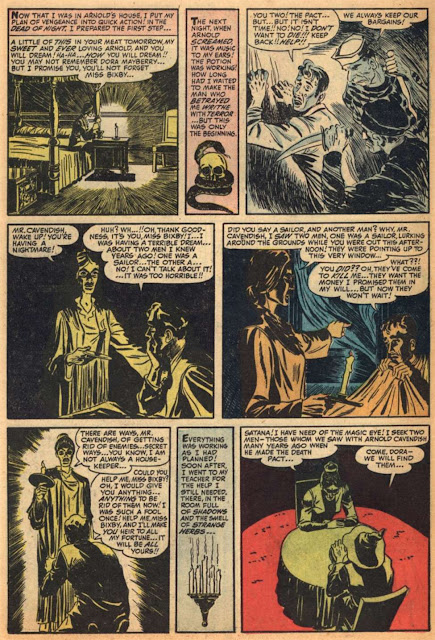Once more it's March, so it's time for another "Women's History Month" post-- though that doesn't necessarily mean finding only stories that would please feminists. Myths about negative aspects of femininity are as vital as those about positive aspects. As it happens, the horror story featured here accentuates the negative for both of the sexes.
As if so often the case with anthology horror stories of the Golden Age of Comics, there's no writer-attribution, though the artist has been identified as Rudy Palais, who was known in his time for an above-average ability to convey a creepy mood.
The story of Dora Mayberry, by her own account scarred with the lines and wrinkles of age, is book-ended on both sides by her relating her tale to an "inner circle" of evildoers made up of one traditional-looking witch, an equally traditional black cat, and several ghoulish-looking males. After showing her listeners the beauty she once possessed, she begins the story in what looks like the 1920s at latest. Dora receives visits from high-class Arnold Cavendish, but Dora's only interested in Arnold because he's rich-- or, more precisely, in the line to become rich when his sick, rich uncle goes to meet his maker. In fact, Arnold's just as greedy to get his inheritance as Dora is, and when the old boy has a heart attack, Arnold makes sure his uncle doesn't get a chance to recover.
However, once Arnold has all the money he'll ever need, he shows his true colors. He wants to live it up with every woman in town, and he refuses to marry Dora as promised. Dora alludes to the possibility of revealing some "secret" they hold in common, but once she's been well and truly spurned, the idea of revealing the secret never comes up again. Instead, Dora decides to sell her soul to Satan for the power to redress her injury, telling her tutor, "Some say women are weak-- but we CAN do evil!"
Up to this point the story has followed a fairly predictable course. However, the unknown writer takes a new turn by revealing that Arnold has a neurotic fear of growing old like his late uncle. He's so deranged on the subject that he makes a contract with two killers, saying that if they kill him painlessly in twenty years, he'll leave them a sum of money in his will. Clearly, Arnold wants to feel like he can burn the candle at both ends and then trust to someone else to keep him from getting old. (The possibility of self-execution apparently never occurs to him.)
Dora then studies the black arts for "long days and nights," which erode both her youth and her good looks. But she hasn't got in mind some mundane death-curse, as the story's title would suggest; she wants to use Arnold's own fears as the means of his undoing. Seven years later, she approaches Arnold, representing herself as his new housekeeper, and since she's no longer beautiful Arnold doesn't recognize her. The rich narcissist has lost none of his mania, complaining that elderly beggars are "people squeezed dry by time." (One might guess that he conflates advanced age with penury, since implicitly he wants to waste the family fortune and then perish before he has to live with the consequences of being a high-living grasshopper.)
Dora's gambit is to spook Arnold with the possibility that the thugs he hired are going to come early for their payoff and so deprive the rich wastrel of twenty years of self-indulgence. To sell Arnold on this possibility, Dora not only sends her victim minatory dreams, she seeks out the two thugs, arranges their deaths, and then turns them into her spectral henchmen. Not only does she panic the fool into committing suicide, she cons him into signing over all his wealth to his faithful housekeeper. Dora ends up becoming a rich old crone who then abets other wronged women into choosing a dark path to vengeance.
Arnold and Dora are practically living symbols of masculine and feminine negativity. Though horror stories harbor any number of male warlocks or magicians who use mystic powers for vengeance, there is in my opinion there is something uniquely feminine about the idea of a "sisterhood" of malefic witches (even though, as I admitted, most of the ghouls at the convocation are male). And although actual sex is not mentioned in "Death," the writer strongly implies that what Arnold wants, once he has money, is a life of "love 'em and leave 'em." Ironically, both of them would have been well suited to each other in terms of selfish greed, and Dora probably would have been an adequate match for Arnold if he didn't have his mania about "hoping he dies before he gets old," to misquote the song.
One half of Dora Mayberry's name sustains some symbolic interest. "Dora" is just a standard wish-fulfillment cognomen, usually translated as "God's gift." However, "mayberry" is one of many names attributed to the plant known as the "common hawthorn" (a specification necessary because various other plants are also called hawthorns). Hawthorn has strong witchy associations, being both used by actual witches in their rituals and employed by ordinary people to avert witchery.








No comments:
Post a Comment